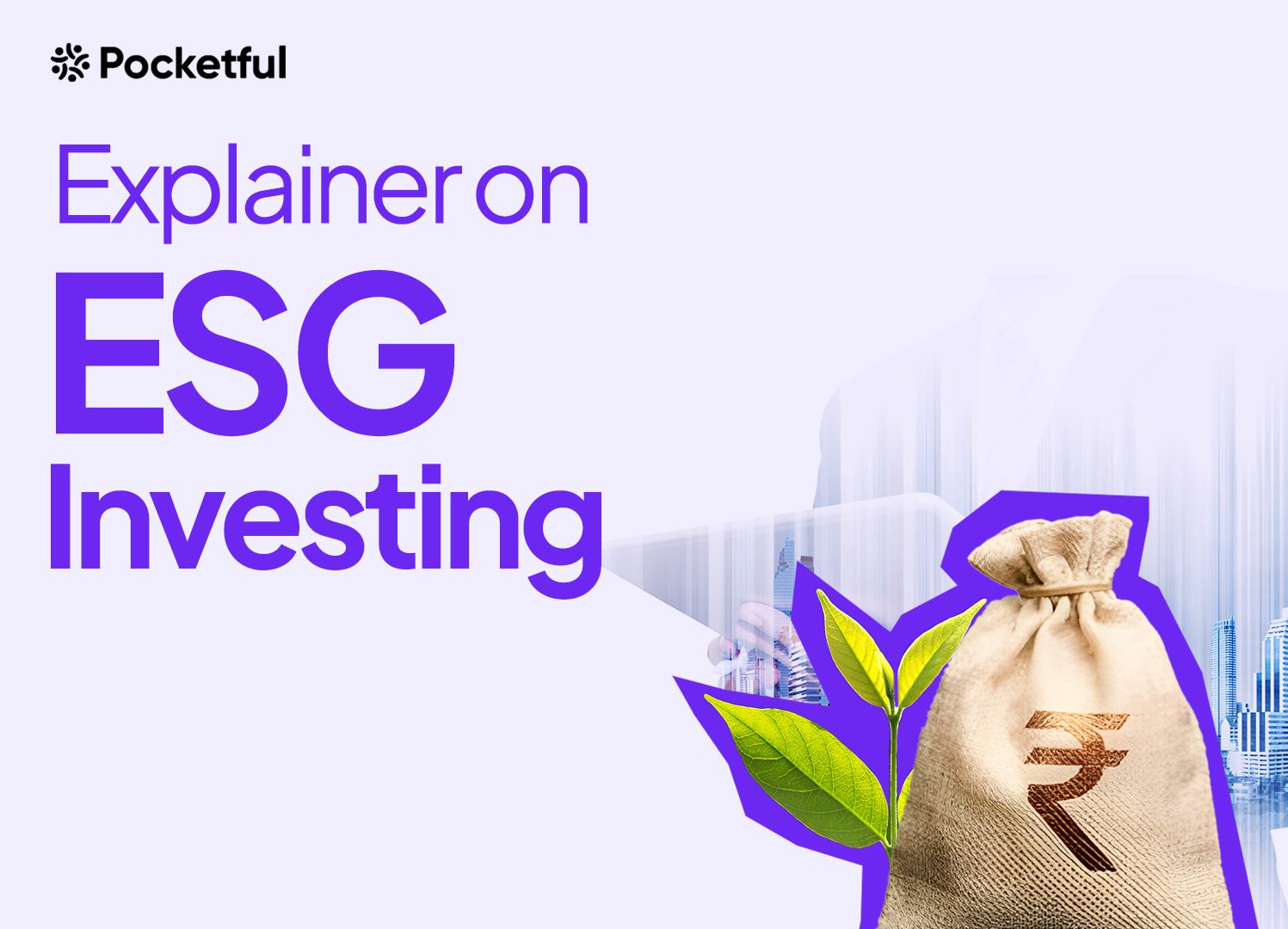| Type | Description | Contributor | Date |
|---|---|---|---|
| Post created | Pocketful Team | Mar-13-24 | |
| Update table Formatting | Nisha | Feb-21-25 |

- Blog
- explainer on esg investing overview pros cons background and mutual funds
Explainer on ESG Investing: Overview, Pros, Cons, Background, and Mutual Funds

Imagine investing in companies that prioritize not just profit, but also the planet and its people. That is the core motive of ESG investing, a concept gaining traction as investors seek to make a positive impact alongside financial returns.
Captivated, right? Let us delve deeper into the blog to discover more about ESG investing and how it can shape your investment journey.
What is ESG Investing?
ESG investing, also known as sustainable investing, is an approach that considers environmental, social, and governance factors alongside traditional financial metrics when making investment decisions.
Here is a breakdown of the three areas,
Environmental
This aspect focuses on the company’s environmental impact, including its climate change policies, carbon emission, pollution, resource usage and waste management. Investors might evaluate a company’s commitment to renewable energy, sustainable practices and environmental responsibility.
Social
This aspect examines how a company interacts with its stakeholders, including its employees, customers and communities. Investors may consider several factors, such as diversity and inclusion, level of community engagement, gender equality, and supply chain ethics, before investing in a company.
Governance
This aspect analyses a company’s internal structure and leadership practices, including board composition, executive compensation, transparency in decision-making, risk management and rights of the shareholders. Investors are generally interested in how well a company is governed and its commitment to ethical and responsible business practices.
By incorporating ESG factors, investors aim to align their values with their investments, identify long-term opportunities and mitigate risks. However, you must remember that ESG investing is a complex and evolving field with varying methodologies and ongoing debate about its effectiveness in predicting financial performance.

Is ESG Investing worth the effort?
Whether ESG investing is “worth the effort” depends on your individual investment preferences and goals as an investor.
Let us have an overview of the pros and cons of ESG investing.
Pros of ESG Investing
- Invest in companies that share your environmental and social concerns, fostering a sense of purpose and positive impact.
- ESG investing might help you avoid companies with environmental or social controversies or negative publicity that could impact their financial performance.
Cons of ESG Investing
- Evaluating ESG factors can be complex and requires thorough research and analysis. Be wary of ‘greenwashing’ where companies may overstate their ESG commitment to attract investors.
- Depending on your goal, finding suitable ESG investment options might be more limited than traditional investments. Additionally, some ESG-focused funds might have slightly higher fees.
- Studies on the relationship between ESG and financial returns are inconclusive. While some research shows equal or even better returns with ESG integration, others show no significant difference or underperformance.
Read Also: A Comprehensive Guide on Mutual Fund Analysis
Background of ESG Investing in India
Investors are focusing on ESG considerations, and driving the growth of ESG funds in India over the past three years. This trend has led to regulatory pressure on companies to increase transparency with ESG disclosures, which leads to greater utilisation of ESG ratings for decision-making.
In this regard, the Securities and Exchange Board of India (SEBI) has introduced a regulatory framework for ESG disclosures by top-listed companies. The framework also includes ESG ratings in the securities market and ESG investing by mutual funds. SEBI has also made ESG disclosures mandatory for the top 1000 listed companies by market capitalisation.
Additionally, recognising the growing importance of ESG factors in the financial landscape of India, SEBI established the ESG Advisory Committee in May 2022 to review and recommend improvements to the regulations for ESG disclosures, ratings and investing. The committee had representatives from corporations, investors, rating providers, mutual funds, technical experts and other stakeholders.
To ensure a reliable assessment of key ESG factors, the BRSR (Business Responsibility and Sustainability Reporting) core framework was proposed. As per the regulations, an ESG scheme should invest at least 65% of its assets under management (AUM) in companies reporting on BRSR.
This framework focuses on 9 important ESG attributes and their linked Key Performance Indicators (KPIs) for ESG-labelled mutual funds.
Attributes and KPIs within the BRSR Core framework
- Greenhouse Gas emission.
- R&D and capex investment in specific technologies to improve the environmental and social impact of products
- Total waste generated, waste recycled and waste disposed.
- The cost incurred on measures towards the well-being of employees and workers, as a percentage of total revenue.
- Gross wages paid to females as a percentage of total wages paid.
- Input material taken from MSMEs as a percentage of total purchases and wages paid to people employed in smaller areas.
- Open-ness of business i.e., level of buying and selling with trading houses, dealers and related parties.

ESG Ratings
ESG ratings assess a company’s environmental, social and governance performance. These ratings measure a company’s exposure to ESG risks and opportunities and how they manage them. Investors use ESG ratings to analyse the company’s long-term sustainability based on its ESG practices. ESG Ratings will be provided based on the compliance with the following criteria
- Environmental parameters such as energy, water, waste management and company operations in or around environmentally sensitive areas.
- Socio-environmental parameters such as the amount spent on Corporate Social Responsibility.
- Social parameters such as job creation in small towns or job creation for differently abled people.
- Governance parameters such as compliance, royalty payments, and related party transactions
MSCI and S&P Global CRISIL offer ESG ratings based on their methodology and criteria.
ESG Funds – An Overview
ESG funds have shown that they can perform just as well, if not better, than traditional funds. Studies have found that companies with strong ESG practices can be more resilient and tend to give better long-term performance. So, you can invest in a way that aligns with your values without sacrificing the returns. It is a win-win.
Additionally, below are some top-performing funds and their returns over the past three years relative to their benchmark.
| Fund name | 1M | 3M | 6M | 1Y | 3Y |
|---|---|---|---|---|---|
| Invesco India ESG Equity Reg | 3.62 | 10.5 | 15.2 | 29.7 | — |
| SBI Magnum Equity ESG Reg | 3.48 | 10.2 | 14.1 | 28 | 14.8 |
| Quant ESG Equity Reg | 13.8 | 25.3 | 30.6 | 54 | 36 |
| S&P BSE 100 TRI* | 5.53 | 13.9 | 16.8 | 32.3 | 17.4 |
| Equity: Thematic-ESG | 5.4 | 13.5 | 17.9 | 32.8 | 16.4 |
*(S&P BSE 100 is a benchmark index for the above-mentioned funds and EQUITY THEMATIC is the category).
Read Also: Mutual Fund Factsheet: Definition And Importance
Conclusion
Deciding whether ESG investing is right for you requires careful consideration of your financial goals, risk tolerance and depth of research you are willing to undertake. Try to understand the specific ESG criteria used by different investment products and their alignment with your values. Discuss your investment goals with a qualified professional who can advise you on incorporating ESG considerations into your portfolio.
Frequently Asked Questions (FAQs)
Why is ESG investing gaining so much traction?
People are increasingly concerned about the planet, social issues and responsible business practices and ESG investing offers a way to address these concerns.
Does ESG investing mean sacrificing returns?
Some studies show that ESG funds offer better returns while others show no significant difference or underperformance. So, it is tough to say if returns must be sacrificed in ESG investing, but the risk of lower returns looms large.
Is ESG investing complicated?
It can be complex since evaluating ESG factors requires research and greenwashing companies can mislead you.
Should I choose ESG investing?
It completely depends on your goals and willingness to research schemes that best align with your ethical values.
What are the challenges of ESG investing?
The link between ESG and financial returns is still debated and evaluating ESG factors can be tedious.
Disclaimer
The securities, funds, and strategies discussed in this blog are provided for informational purposes only. They do not represent endorsements or recommendations. Investors should conduct their own research and seek professional advice before making any investment decisions.